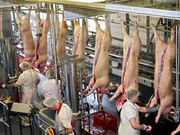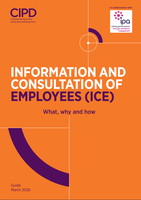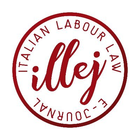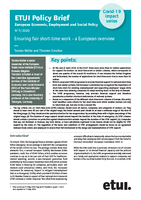 |
| Download pdf file | Newsletter archives | |||
| Dieser Newsletter auf Deutsch | Cette newsletter en français | |||
1. Works council meetings in these times of the Coronavirus crisis |
 |
|
Videoconferencing possible in Germany until the end of the year
Following the declaration by the German Minister of Labour Hubertus Heil (Social Democrats) on 20 March 2020 announcing that works councils may exceptionally hold meetings as video conference during the Coronavirus crisis (see report in EWC News 1/2020), this has now been enshrined in law. This special regulation was announced in the Federal Law Gazette on 28 May 2020 and applies to all levels of works council activities, i.e. also to EWCs, SE works councils, economic committees and arbitration bodies. The special regulation retroactively covers all meetings since 1 March 2020 and is limited in time until 31 December 2020. Labour courts can also hold virtual meetings.
It must be ensured that third parties do not have access to the content of the meeting. Recording is not permitted. To this end a new article 129 has been inserted into the German Works Constitution Act, in the European Works Council Act it is the new article 41b, and in the SE Participation Act, the new article 48. Special negotiating bodies may meet by video conference when negotiating an EWC agreement, but not when negotiating an SE. The legislator has probably overlooked the latter. Previously EWC meetings as video conferences were only permitted for crew members of seagoing vessels (see report in EWC News 2/2017). The temporary special regulation only applies if the EWC or SE works council is subject to German law. Under French law EWC meetings can already be held as video conferences since 2015 (see report in EWC News 3/2015).
Full text of the new regulations (from page 1051 on) Legal commentary on Art. 129 German Works Constitution Act Critical statement of the German Trade Union Confederation Information on the EWC and SE Act from the Hans Böckler Foundation
From 6 to 8 October 2020, we are holding a seminar in Berlin on online meetings, audio and video conferences for works councils.
France allows instant messaging for resolutions
In France special regulations have come in force since 3 April 2020 for the duration of the public-health emergency. In principle works council meetings can be held as video or telephone conferences once the employer has informed the elected representatives. If such conference calls are not technically possible, meetings and resolutions can even be made via instant messaging, but this requires a company collective agreement. The rules will apply until the end of the public-health emergency on 10 July 2020.
In France, works councils always meet under the chairmanship of the employer, who also invites members to the meeting. Video conferencing was already legally possible before the Coronavirus crisis, if this was expressly agreed between the employer and the works council. Without such an agreement, the employer was only allowed to hold three meetings per year as video conferences. French works councils meet at least six times a year by law, and monthly in companies with 300 or more employees. Before each meeting, the employee representatives meet for internal preliminary discussions without the employer.
There are to be no works council elections between 12 March and 31 August 2020, and the term of office, including protection against dismissal, is automatically extended by a few months. Unlike in Germany, there is no uniform election date nationwide for works councils in France and each company sets its own date completely independently.
Shortened consultation deadlines to rapidly kick start the economy
French works councils must be consulted in advance when decisions are taken on employment and working conditions as well as on health and safety in the workplace. Although the employer is not obliged to adopt any of the works council's proposals, he has to wait for the council's opinion so that he may theoretically take them into account. The deadlines for completion of a consultation procedure are therefore very important. The Coronavirus crisis particularly involves teleworking, short-time work or measures to ensure a safe return to work. To this end, the time frame applicable since January 2014, which is normally two months (see report in EWC News 1/2014), has been reduced to between eleven and twelve days. The shortened duration applies from 3 May to 23 August 2020, but not to dismissals of ten or more employees.
Full text of the special regulation on works council meetings Overview of the shortened consultation periods
European trade unions reject video negotiations
On 20 April 2020, the sectoral trade unions in Brussels presented joint recommendations for negotiations on EWC and SE agreements during the Coronavirus crisis. They hereby declared their fundamental opposition to negotiations in the form of telephone or video conferences. Instead, such meetings should be postponed, until face-to-face meetings are once again possible. The recommendations are available in eight languages.
These negotiations lay the foundations for transnational social dialogue in multinational companies. Without a quality agreement there can be no efficient EWC or SE works council. Securing a quality agreement is all the more important because it is a legally binding document that defines the rights and obligations of the parties for the coming years. It is therefore of utmost importance for the trade unions that the requirements for conducting negotiations properly are fulfilled. According to the recommendations, if face-to-face meetings are not possible and deadlines expire, it could be preferable to let the negotiations fail. If negotiations have not yet begun, it is hardly possible to properly constitute the Special Negotiating Body. In some countries it is currently not possible to nominate delegates, e.g. in France all election procedures have been suspended by the legislator.
Full text of the recommendations Download the other language versions
Court decision on video negotiations in Italy
On 11 June 2020, the Tuscany Court of Appeal in Florence (photo) ruled that the Sofidel Company had acted in an anti-union manner in establishing its European Works Council. The Central management of the paper manufacturer had refused categorically to accept any physical meetings of the Special Negotiating Body and wanted only to finance video conferences without interpreters. In February 2019, the first instance court in Lucca had even approved the procedure (see report in EWC News 1/2019). As the application for the establishment of the EWC was already submitted in February 2014 and the negotiation period long since expired, a default EWC is now being established by order of the court. The company will also have to pay all court costs.
Report on the history of EWC establishment |
 |
2. Job gains and losses during the Coronavirus crisis |
 |
|
European Restructuring Monitor provides daily figures
The European Restructuring Monitor (ERM) has been monitoring the impact of major corporate restructuring in Europe on employment since 2002. For this purpose, the European Foundation for the Improvement of Living and Working Conditions (Eurofound) an EU agency in Dublin, evaluates press reports in 29 countries on a daily basis and makes them available to the public in a database. The database can be searched by country, sector and other criteria.
Since 1 March 2020, 160,000 job-losses have been announced, most of them in the UK (38%), Sweden (15%) and France (10%). At the same time 46,000 new jobs have been created, many of them in the UK (37%), followed by France (18%) and Poland (12%). Crises reinforce and accelerate existing trends, as can be seen in the sectoral distribution. For example, the private British healthcare company Cera Care is looking for 10,000 new nursing staff.
The Restructuring Monitor database Eurofound survey with country analysis Country and industry sector analysis from the HitHorizons data platform
Negatively affected: Aviation, hotel and catering industry
The English restaurant chains Carluccio's (2,000 jobs) and The Restaurant Group (1,500 jobs) as well as Vapiano from Germany (2,500 jobs) have all had to file for bankruptcy. The Norwegian hotel chain Nordic Choice Hotels is cutting almost half of its workforce: 4,500 employees in Sweden and 3,000 in Norway and Denmark. The Swedish hotel chain Scandic plans to cut 2,000 jobs in Sweden alone. The British hotel and travel company Specialist Leisure Group (SLG) went into insolvency (2,500 jobs).
Major upheavals in the retail sector
The Debenhams department store chain had to close all its stores in Ireland (2,000 jobs) and file for bankruptcy for its British stores. Dixons Carphone, an electrical and mobile phone chain, closed all its stores in Britain (2,900 jobs). Adelie Foods, a British manufacturer of packaged sandwiches, has filed for bankruptcy (2,200 jobs). In contrast, the German discount store Aldi is currently massively increasing its workforce in the UK (4,000 permanent jobs and 5,000 temporary contracts). Aldi is also expanding its workforce in Spain by 20% (800 new jobs).
The British retail chain Morrisons will create 1,000 new jobs in its supermarkets and hire 2,500 packers and drivers to expand its home delivery service. Coolblue, the Dutch chain of electronic and household products, will create 2,000 jobs, in particular for bike courier and repair services. The US mail-order company Amazon is expanding strongly: 1,000 additional jobs in the logistics center in Seville (Spain), 1,000 in the new logistics center in Gliwice (Poland) and 600 in the logistics center near Prague. The German online mail order company Zalando is looking for 1,300 new employees for its logistics center near Łódź (Poland) and the Polish wholesale group Eurocash is looking for 2,000 nationwide.
Financial services and technology sector
Traditional banks are losing market share to payment service providers. For example, Allied Irish Bank (AIB) will reduce its workforce by one third (1,500 jobs). The major English bank Barclays will cut 1,145 jobs in its home country and the second largest commercial bank in Poland, Bank Polska Kasa Opieki, 1,200 jobs. On the other hand, Mastercard will quadruple its workforce in Ireland (plus 1,500 jobs) in order to expand electronic payment transactions. Jobs will also be created in the French technology sector: at Sopra Steria 1,300 and Assystem 1,500. The Spanish electricity company Iberdrola will create 5,000 new jobs in Spain this year alone and invest massively in the energy turnaround.
Manufacturing industry slow to react but high number of layoffs
There will be job cuts without compulsory redundancies at the third-largest German automotive supplier ZF Friedrichshafen, which plans to cut 15,000 jobs worldwide, half of them in Germany, as well as 6,000 jobs at the German car manufacturer BMW.
The reaction of the unions at Renault The reaction of the unions at Nissan The reaction of the unions at Rolls-Royce |
 |
3. The Brexit clock continues to tick during the Coronavirus crisis |
 |
|
Still no trade agreement in sight
The United Kingdom is no longer a member of the EU since 1 February 2020 but has to comply with EU rules until 31 December 2020, similarly to Norway. Discussions on future cooperation started on 2 March 2020, with further rounds of negotiations only possible thereafter via videoconference. On 12 June 2020, the British government announced that it did not wish to request an extension to the transitional period, which lies in contradiction with public opinion. 54% of the British want an extension of the Brexit transition period and 95% believe that the country should cooperate closely with the European Union to combat the coronavirus.
The British government wishes to maintain as far as possible, an unhindered access to the (European) single market. In return, the EU expects the UK to comply to the standards and regulations of the single market in order to ensure a level playing field. This includes compliance with the same social and environmental standards. If no agreement is reached by the end of 2020, there is the threat of a hard Brexit. In these circumstances, large companies have announced the closure of factories, e.g. Airbus with 14,000 and Nissan with 7,000 jobs. The prices for food and cars from the EU would rise considerably due to new tariffs.
Developments on the domestic political scene
Following the Conservative Party's victory in the early parliamentary elections held on 12 December 2019 (see report in EWC News 4/2019), popular support initially rose to over 55% at the start of the Coronavirus pandemic and then plummeted massively within a few weeks. In ten years, no other prime minister has lost so much popularity within such a short time. The Labour Party with its new leader has almost been on a par with the ruling party in the election polls since the end of May 2020, with almost 40%, the opposition leader has been more popular than the incumbent prime minister since the end of June 2020.
Diagram showing the progression of election polls Poll on the popularity of the opposition leader Analysis of the Labour Party under its new leader The impact of Brexit on UK labour law
On 20 January 2020, the Parliament of Northern Ireland rejected the Brexit contract on the grounds that it would cause "untold damage" to Northern Irish companies. On 2 June 2020, it called for an extension to the transition period because the British government was unable to introduce complex border controls along the Irish Sea while the country was dealing with the coronavirus crisis. Neither of the decisions have any legal significance, but both are highly important politically.
Since the Government of Scotland officially requested permission for a second Scottish referendum on independence as early as 30 March 2017, popular support has slowly but steadily been on the increase. In April 2017 only 34% of all Scots wanted to be independent (53% did not), at the beginning of June 2020, 48% were already in favour of independence (45% against).
New Brexit recommendations for European Works Councils
On 22 April 2020, the sectoral trade unions presented joint recommendations for EWC and SE agreements in relation to Brexit in Brussels. Should there be no agreement between the UK and the EU on the issue of future relations during 2020, the legal situation would be open as of 1 January 2021. Although the British legislator has ensured that all EU regulations (including the transposition of the EWC Directive) are to remain part of British domestic law for the time being, in the future, however, the House of Commons would be free to decide which legislation is to be retained, amended or repealed.
There are delegates from the UK in more than 70% of the 1,178 companies that have a EWC or SE works council, and 179 of these work under UK law. The British government published a communication for them on 8 August 2019. It does not wish to abolish British EWC law (TICER 2010) but would like to freeze it. All European Works Councils on British soil could continue to operate and no British member of a Continental European EWC would lose his or her mandate. Even applications for the establishment of a EWC made before 1 January 2021 remain valid and can be negotiated up to their conclusion. However, from 2021 on, it would no longer be possible to establish new European Works Councils under British law. Nevertheless, even in these cases the government is encouraging companies to involve British delegates in European Works Councils on a voluntary basis.
The trade unions' recommendations include the following points:
1. Review of the agreement to determine whether it requires amendment In the event that the UK transposition law TICER 2010 is no longer applicable, the UK should continue to be fully covered by the EWC agreement and the EWC should be responsible for all cross-border issues relating to the UK. The UK EWC members should also continue to enjoy the same rights and protection as all other EWC members.
2. Should the EWC be subject to UK law, EWC Members should play an active role in determining the new jurisdiction (applicable national law) The choice of a new jurisdiction should be based on objective criteria and not depend on management's desire to move to a country with a low standard. Therefore, EWC members should not wait for management to make a unilateral decision, but proactively put this issue on the agenda immediately. The European Commission expects that UK EWC agreements will automatically and immediately become subject to the law of the EU country with the most employees on 1 January 2021, unless the company explicitly specifies a different jurisdiction beforehand. This is contrary to the UK legal position, which requires that an EWC under UK law to continue to operate under UK law. The UK legislator has simply replaced the term "Member State" with "relevant State".
Communication from the British government The amendments to the UK EWC Act Communication from the European Commission Full text of trade unions' recommendations Empirical analysis of the European Trade Union Institute
Forthcoming event
The legal situation for European works councils, which will arise after the end of the transitional period, will be on the agenda at our EWC conference in Hamburg on 25 and 26 January 2021. |
 |
4. Confidential information in the EWC |
 |
|
Secret negotiations in the USA are not an issue for the EWC
On 3 April 2020, the Central Arbitration Committee (CAC), the first instance in British EWC law, announced its third decision in the case of the US telecommunications group Verizon. Its European works council, which represents 4,380 employees in Europe, had previously initiated two other cases and won one of them (see report in EWC News 4/2019) and lost another (see report in EWC News 1/2020).
On 13 August 2019, one day after the signing of the contract with the buyer, the EWC was informed of the imminent sale of its blogging platform, Tumblr with 188 employees. Despite the small number of only five employees affected in three European countries, the EWC was seeking to clarify the basic question of whether the US headquarters is allowed to disclose such sales negotiations only after the final agreement has been reached with the buyer. The scope of the information which was subsequently provided to the EWC and the level of management that answered questions from the EWC in two extraordinary meetings held on 28 August and 5 September 2019 were also addressed in the legal complaint.
The CAC found that despite the small number of employees affected in Europe, the issue did fall within the competence of the EWC. In another case French judges had found that 2.5% of the European workforce was too low (see report in EWC News 3/2015). Many EWC agreements even explicitly prescribe an exact threshold. Although the Verizon EWC had to be involved, the CAC was of the opinion that central management was allowed to delay the notification until the purchase agreement had been negotiated. During the negotiations, both parties had agreed to strict confidentiality and even at Verizon's headquarters, only a few people were privy to the information. The sale of Tumblr was a huge loss for Verizon.
Withholding of information weakens EWC's working capacity
In early May 2020, the European Trade Union Institute (ETUI) in Brussels presented for the first time an empirical study on how EWCs deal with confidential information. When is confidentiality legitimate and when is it not legitimate? Using two Belgian and two US companies as examples, the study examines the extent to which management tries to declare and withhold information as confidential, what strategies EWC members use to deal with confidential information and how this affects the functioning of the EWC. US companies make particularly excessive use of the confidentiality red card. One EWC member declared: "The management approach is to keep the EWC as passive as possible. To keep full control of everything."
There has been a lot of research on information and consultation practices in EWCs over the last few years. Although information exchange and confidentiality are directly related, little is known about confidentiality practices, problems and strategies. In a large survey of European Works Council members (see report in EWC News 1/2020) many reported that they were confronted with illegitimate and strict confidentiality rules and withholding of information. Either management refuses to disclose all information or they feel restricted in communicating with employee representatives in their home country. Sometimes the steering committee also receives information that it should not pass on to the other delegates. As one EWC representative, who is informed and consulted in a timely and duly manner but who is subject to strict rules on confidentiality, put it in a nutshell: "What happens in Europe stays in Europe".
EWC and management: a boxing match or a dance?
Normally information at an early stage should be provided with high confidentiality and information at a later stage with less confidentiality. Paradoxically, however, the withholding of information goes often hand in hand with strict confidentiality rules. This suggests that confidentiality is not used to enable genuine consultation (as it should be), but to prevent the EWC from carrying out its tasks. Employers who do not want the EWC to function correctly can use various means, such as not providing information or declaring everything confidential. In the study the following anecdote is described: The EWC members went to the meeting and announced to management: "As we have no documents or agenda, we have nothing to discuss with you". They then left the room. The employer was shocked. Only subsequently did discussions start on how to work together in a reasonable manner.
Theoretically, the EWC is kept up to date on general company strategy, mergers and strategic investments at an early stage - sensitive issues which, if published, could seriously harm the company and its workforce. Consequently, trust plays a crucial role. Researchers suspect that up-front information and reduced demands for confidentiality go hand in hand with true, non-confrontational relationships (partnership strategies) between the social partners. The main question is therefore, under what conditions a relationship of mutual trust between management and employee representatives can be developed.
Forthcoming event
One of the authors of the study will report at our next EWC conference in Hamburg on 25 January 2021. |
 |
5. Court rulings in France and Spain |
 |
|
Amazon deliveries halted due to lack of security measures
On 14 April 2020, the Regional Court in the Parisian suburb of Nanterre ordered the closure of all six Amazon distribution centers in France. The 10,000 employees affected were therefore forced to stay at home on full pay for five weeks. An application for short-time work was rejected by the Ministry of Labour because the standstill was not due to a lack of orders. The trade union SUD had filed a complaint, demanding protective equipment and measures for social distancing for the distribution center's workers. SUD is a small left-activist union in competition with the established confederations, which organizes many poorly paid and precarious workers, e.g. at parcel delivery companies or in call centers (see report in EWC News 2/2012).
Amazon has had to limit itself to shipping vital products (food, hygiene and medical supplies) until protection measures are improved. On 24 April 2020, the Versailles Court of Appeal confirmed the verdict. The fine per infringement was set at 100,000 € and the company was ordered to carry out a risk assessment and implement all necessary health and safety measures in collaboration with the works councils. The court's decision was preceded by five warnings from the health and safety authorities and two complaints from trade unions, to which Amazon has not responded.
In France, in addition to the possibility for trade unions and works councils to take legal action, there is also a legally guaranteed right of withdrawal from the workplace, which an employee can claim individually if the employer puts his health at risk.
Press report on the closure of the distribution centers Video with interviews on the events at Amazon in France Report on trade union actions at Amazon in the USA and Italy
Car factory temporarily closed again
On 7 May 2020, the Regional Court of Le Havre, a town at the mouth of the Seine into the English Channel, ordered the closure of the Renault factory in neighbouring Sandouville. Production of station wagons had been resumed on 28 April 2020, after a standstill of several weeks following an agreement on a health and safety plan drawn up by the plant management and three trade unions. For the CGT which is the largest union representing 36% of the 2,600 workers, this was not extensive enough. For example, it demanded safety training for every worker before starting work. The ruling has caused a huge political stir: the General Secretary of the social democratic trade union confederation CFDT as well as the French Minister of Economy criticized the left-wing CGT for its decision to go to court.
Redundancies at Ryanair in Spain declared invalid
On 24 April 2020 in Madrid, the Spanish Supreme Court for Collective Labour Law, the Audiencia Nacional de España, declared the dismissal of 224 Ryanair employees null and void. The judges ordered the Irish airline to immediately continue to employ all those affected under the same conditions under which they had previously worked, and to retroactively pay all outstanding wages. The reason for the redundancies had been the closure of three bases in the Canary Islands and a downsizing in Girona (Catalonia), which had already been announced in August 2019 and implemented on 8 January 2020.
The oral hearing took place on 10 March 2020 and lasted seven hours. During the hearing, the judges came to the conclusion that Ryanair "did not seek to carry out a consultation phase required by law". The ruling also emphasized the "total lack of consideration" for the trade unions. The company had taken an irrevocable decision and at no time had it seriously considered negotiating the social plan (Expediente de Regulación de Empleo - ERE). The social plan was therefore legally challenged by three trade unions and in the end the court declared it invalid.
No dismissals can be implemented without an effective consultation. This is not the first case in which the Audiencia Nacional has ruled in this sense. In June 2014 it had already prohibited the dismissal of 1,190 Coca-Cola employees in four Spanish bottling plants for similar reasons (see report in EWC News 2/2014). Ryanair is also coming into conflict with the law in other countries due to its unconventional HR policies (see report in EWC-News 3/2017).
Former Goodyear employees receive additional severance pay
The redundancies which were originally planned in 2007 had been prevented for a long time because the social plan was repeatedly stopped through legal action (see report in EWC News 4/2009). The plant was only closed down in 2014. At that time, each dismissed employee received a severance payment of between 60,000 and 130,000 €, depending on length of service. As a result of the new ruling, an average of another ten months' salary is now being added - plus interest.
Star lawyer Rilov: hunting down the multinationals
The Goodyear employees were represented by Maître Dr Fiodor Rilov, whom the press calls the "tsar" of the Parisian legal profession and the "feared opponent" of employers. He holds 24th place in the ranking of the most influential lawyers of the French Republic. The London-born communist with Jewish revolutionary parents (father from the Soviet Union, mother fled from Germany) specializes in suing multinational corporations that make enormous profits and yet fire employees. He does not charge an hourly fee, but works on a success basis. In the Goodyear case he will receive a fee of 10% of the globally agreed severance package, estimated at 1.5 million €. He represented the employees of the tire plant in neighbouring Clairoix, which was closed by the German Continental Corporation in 2010, with a similar result (see report in EWC News 3/2013). His clients also include Samsonite, where he sued a financial investor in Boston (USA), as well as Stora Enso, Coca-Cola or Cargill. When he is not combatting mass redundancies, he can be found in the courtrooms attacking the labour laws of President Emmanuel Macron.
Television interview with Fiodor Rilov |
 |
6. Recording of working time and wage dumping |
 |
|
First German court ruling on the recording of working time according to EU law
On 20 February 2020, the Emden Labour Court (Northwest of Germany) ruled on the wage entitlement of a construction worker for overtime worked. He submitted his own handwritten records while the employer had not kept a correct record of his working hours. The court therefore ruled in favour of the construction worker. The employer had violated the Charter of Fundamental Rights of the European Union, which requires the establishment of an objective, reliable and accessible system for recording daily working hours.
This is the first ruling in Germany that refers to a landmark decision of the European Court of Justice on the recording of working time from May 2019 (see report in EWC News 2/2019). In Germany, employers are currently only obliged to record overtime under current legislation. Many companies believed that the ruling from Luxembourg only obliged the legislator to adapt the German Working Hours Act. The Emden Labour Court, on the other hand, sees an immediate obligation for each individual employer to act - even without changing the law.
Legal appraisal on recording of working time
From 6 to 8 October 2020, a seminar on the recording of working time and the influence of EU law on German labour law will be held in Berlin.
Meat industry: wage dumping should no longer be a business model
On 20 May 2020, the German government adopted the key points of an "Occupational Health and Safety Plan for the Meat Industry". The planned amendments to the law provide for a general ban on contract and temporary workers in the meat industry as of 1 January 2021, with the exception of butcher's trade. Furthermore, fines for violations of working time regulations are to be doubled and the obligation to record working hours digitally is to be laid down. In the German meat industry, most work is carried out on the basis of contract labour, and the permanent workforce has fallen to a mere 10% in some firms.
For years, European meat companies have been relocating large parts of their business to Germany because the wage costs for Eastern European workers can be kept particularly low there. Within ten years Germany has gone from being a net importer to a net exporter of meat. In March 2013, the Belgian government filed a complaint with the European Commission against social dumping in German slaughterhouses (see report in EWC News 2/2013). Working and accommodation conditions of the more than 40,000 migrant workers from Eastern Europe are also under criticism: overcrowding, extortionate rents, violations of the Minimum Wages and Working Hours Act and of hygiene, social distancing and health and safety regulations. An accumulation of coronavirus infections in meat processing plants has brought the topic back into the public eye.
The employers' associations fear that the ban on contract and temporary workers could later be extended from the meat industry to other sectors. On 11 February 2020, the red-red-green Berlin Senate (local government) decided to submit a motion to the Bundesrat to curb temporary work in hospitals and nursing homes.
Payment of temporary workers before the European Court of Justice
On 25 May 2020, the Kaiserslautern Labour Court decided to refer the question of Equal Pay to the European Court of Justice. It must clarify whether poor pay for temporary workers is compatible with EU law. While temporary workers in Poland and Belgium earn the same amount as permanent staff, in France they even receive a 10% bonus. The EU Directive on temporary agency work, which has been transposed into national law since December 2011, lays down the principle of equal treatment. However, it allows for exceptions if temporary workers have an open-ended employment contract, are paid in periods between assignments and a collective agreement which allows for lower pay.
Twelve countries allow derogations from equal pay: Denmark, Sweden, Finland, the Netherlands, Germany, Austria, Italy, Malta, Hungary, Bulgaria, the United Kingdom and Ireland. Without specific collective agreements, none of these countries would have a legal basis for unequal pay. Although the collective agreements negotiated by the Confederation of German Trade Unions (DGB) provide for relatively good wages and working conditions, they do not reach the level of pay of the core workforce. There are also differences in the maximum duration of unequal treatment. In the UK, temporary workers are entitled to full equal treatment after 12 weeks in the same workplace, in Malta after 14 weeks, in Hungary after six months, but in Germany only after nine to 15 months. In Germany, more than 800,000 people were employed in temporary work in 2019, or 2.5% of the total workforce. Since 2001 this number has almost tripled.
"Däubler campaign" demands equal pay for equal work
The lawsuit is part of a campaign by the prominent labour law expert professor Wolfgang Däubler and the left-wing network LabourNet Germany, which was made public as part of the ZDF television political cabaret program, "Die Anstalt" in May 2017. The plaintiff is a 28-year-old temporary worker who was paid a little more than the statutory minimum wage for a physically demanding job at a private waste disposal company in the Kaiserslautern region, almost 4 € per hour less than permanent employees. He filed a claim for this difference in court. The aim of the lawsuit, which is financed by crowdfunding, is a fundamental court ruling in favor of equal pay. Three similar cases of the campaign are currently pending before the Federal Labour Court.
Background report on the Däubler campaign LabourNet dossier and interview with Prof. Däubler DGB press release on the current collective agreement |
 |
7. Accelerated erosion of supervisory board co-determination |
 |
|
Foreign legal forms and SE undermining the German system
More and more companies are using foreign legal forms in order to limit the influence of workers on supervisory boards or to completely avoid co-determination. While there were only three individual cases back in 2000, by 2015 there were 5% of all companies with more than 2,000 employees in Germany and now more than 17% have already taken this path in 2020. It is also possible to legally avoid co-determination by means of the European Company (SE) legal status. The Hans Böckler Foundation released up-to-date figures on 29 April 2020. As early as 2015 it had described the increase as "dramatic" (see report in EWC News 1/2015), but since then the figures have virtually exploded.
More than 1.4 million employees in 194 large companies are excluded from full-parity participation on the supervisory board through legal constructions, 150 of these companies use a legal form with a European dimension (other than SE). In another 113 large companies with just under 660,000 employees, the Co-Determination Act is simply ignored and supervisory boards are composed entirely of shareholder representatives. 370,000 employees in 24 large companies benefit from limited co-determination rights through the legal form of a partnership limited by shares (KGaA). Although there is a supervisory board with equal representation of shareholders and employees, it only has rudimentary powers. If German and foreign legal forms are combined, a company - even if it only operates in Germany - is no longer subject to the German Co-Determination Act. One such example is the Meyer Neptun Group, which has turned Luxembourg into the largest location for deep-sea cruise ships (see report in EWC News 4/2015).
The European Company (SE) escape route
More than 80% of all SE conversions throughout Europe are attributable to Germany alone. The legal form is particularly attractive for family businesses because co-determination on the supervisory board can either be completely avoided or frozen. Time and time again, SE conversions take place shortly before the legal thresholds of 500 employees in Germany (one-third participation) or 2,000 (full-parity co-determination) are reached, even at the last minute (see report in EWC News 3/2018). According to the current legal regulations the status quo is then frozen and many can irrevocably leave the system of co-determination (see latest examples in EWC News 1/2020). 58 companies with 236,000 employees in Germany would today be subject to full-parity co-determination if there had not been an SE conversion. A particularly blatant example of escaping co-determination is the mail order company Zalando (see report in EWC News 4/2015).
A rapidly growing variant is the legal form SE & Co. KG or SE & Co. KGaA. As already explained above, their supervisory boards only have rudimentary powers and the SE works councils are often dissolved in favor of a normal European works council, most recently at seed manufacturer KWS Saat (see report in EBR News 4/2019). Currently 24 companies with 138,000 employees belong to this group. A spectacular example of avoiding co-determination through an SE & Co. KG is offered by the Japanese electronics group Olympus. Here the German group works council is setting a precedent in taking legal action through the courts (see report in EWC News 3/2019).
Demand for changes to the legislation
In the opinion of the Hans Böckler Foundation, the legislator should ensure that all companies with 500 employees or more in Germany abide by co-determination laws, even in the case of constructions with a foreign legal form. For an SE, participation rights should automatically increase when thresholds (500 or 2,000 employees) are exceeded. If the Co-Determination Act is unlawfully ignored, a company should be effectively sanctioned. This could be ensured by a "Co-Determination Extension Act". The European Commission is being requested to draft a framework directive on information, consultation and company co-determination in order to set general minimum standards for co-determination throughout Europe. On 11 February 2020, the German Trade Union Confederation (DGB) had already presented key points on this subject.
Press release on the current study Co-determination report of the Hans Böckler Foundation Video explaining co-determination |
 |
8. New SE conversions |
 |
|
France's largest media group operating as a SE
Vivendi was registered as a European Company (SE) on 16 January 2020. The Paris-based media group has 44,000 employees in more than 100 countries around the world and is represented in the music, film, television, publishing, telecommunications and Internet sectors. Vivendi is largely controlled by the Bolloré family, one of the ten richest industrialists in France, which has also converted its holding company into an SE (see report in EWC News 1/2020).
Under the SE Participation Agreement of 6 November 2019, the SE Works Council will replace the EWC, which has been in place since 1995. It will be chaired by the son of the family patriarch in his role as CEO of Vivendi. He appoints three further top managers who belong to the SE Works Council in an advisory capacity. The employee side is composed of 27 delegates from 22 countries, including five from France and two from the UK. They elect a spokesman ("secretary") and four other members to the SE works council Board. The SE Works Council will meet twice a year in Paris, while the Board takes care of day-to-day business in between times. The delegates may use video conferencing systems at any time to communicate with one another, but this does not replace meetings.
There are precisely defined provisions for time-off work according to the French model, whereby the time for normal meetings and travel are not counted. Each delegate has an annual allowance of 30 hours, Board members 60 and the secretary 90. An additional four hours of time-off work is provided for each extraordinary meeting. During the four-year term of office, each delegate is entitled to five days training and 30 hours of language training. Typical for France is the comprehensive support by experts. The SE Works Council can call on a permanent chartered accountant within a budget of 30,000 € per year and for additional specific advice up to 5,000 €. If restructuring is necessary, additional budgets are available.
An extraordinary consultation of the SE Works Council will take place if at least 3% of the respective workforce is affected in two countries. In a first meeting, the SE Works Council or the works council Board is informed about the planned measures and can appoint an expert. One month later, the second meeting will be held during which the expert presents his report and the SE Works Council renders its opinion. The Vivendi Administrative Board consists of ten members, two of whom are employee representatives. One is elected by the French works councils and one by the SE works council.
Full text of the Conversion Plan
German family-owned company against co-determination on the supervisory board
The building materials group Sievert from Osnabrück has been operating as an SE since 27 May 2020. There are 1,700 employees working under the umbrella of the holding company who were previously not allowed to elect employee representatives to the supervisory board. By means of this SE conversion, the absence of codetermination will be established on a permanent basis. In addition to Germany, there are subsidiaries in the following EU countries: Netherlands, Luxembourg, Poland, Slovakia and the Czech Republic.
An SE participation agreement drafted by the employer was even signed at the constituent meeting of the Special Negotiating Body on 5 May 2020. The SNB consisted of nine delegates from Germany and one from each of the other five countries. Due to the coronavirus pandemic, the delegates from Poland, the Czech Republic and Slovakia participated via video conference. The SE Works Council ("European Employee Committee") has nine members, including four from Germany, and meets twice a year. Videoconferences are possible, but cannot be imposed by central management against the will of the works council. The agreement is otherwise largely based on the standard rules of the EU directive.
Press release on the SE conversion
German semiconductor manufacturer freezes one-third participation on Supervisory Board
Since 1 July 2020 Elmos Semiconductor has been operating as an SE. The semiconductors and sensors manufactured by the company from Dortmund are mainly found in cars. With its 1,300 employees in Germany, the listed company is subject to one-third participation: two of the six supervisory board members come from the works council. In the SE, this allocation remains in place; both employee directors are elected by direct vote. Elmos Semiconductor has only five employees abroad, namely in the Netherlands. By means of the SE conversion management was able to ensure that there will never be full-parity co-determination on the Supervisory Board. SE conversions for this purpose with a negligible number of foreign staff have also occurred in other cases, e.g. at the German financial services provider MLP (see report in EWC News 3/2017).
The SE Employee Participation Agreement was signed on 30 September 2019. The SE works council ("Elmos SE Committee") meets twice a year. Its members include delegates from all subsidiaries, including locations without a works council. Since there is no central works council, the SE Committee is the only cross-location works council body in Germany. In exceptional circumstances information and consultation with simultaneous implication of a local works council is only provided if the Elmos SE committee expressly requests it.
Full text of the conversion report (see from page 38 on) Press release on the SE conversion Further information on the SE legal form
The next introductory seminar for SE Works Councils will take place at Montabaur Castle from 20 to 23 October 2020.
|
 |
9. The view beyond Europe |
 |
|
Global agreement on Digital Transformation
On 17 March 2020, a global agreement on digital transformation was signed for the Belgian chemical group Solvay, one of the world's ten largest chemical companies. The text was initially drafted for Europe by the European Works Council, but was then extended to all 61 countries around the globe, since otherwise only half of the 24,500 employees would have been covered. Solvay has had a World Works Council since 2015 and provides company profit-sharing for the entire workforce (see report in EWC News 2/2015).
The agreement defines exactly what is meant by the digital transformation and what must happen when jobs are affected so that solutions can be worked out in advance. In the preparation phase of major projects, there are provisions for a systematic analysis of all the effects on health and safety, workload, work organization, qualification requirements and monitoring possibilities. The agreement also contains provisions on training and skills development, the collection and protection of personal data, and the procedure for dismissals.
Before any final decision is taken on the introduction of new technology, an information and consultation procedure is carried out with employee representatives at the appropriate level (global, European, national and/or local). Implementation of the agreement is regularly monitored by the EWC and the World Works Council. While there are other examples of such agreements in Europe, for example in November 2019 in the French energy group Engie (see report in EWC News 4/2019), this is the first global agreement on this subject.
Social responsibility in anticipation of international framework agreement
On 28 April 2020, the central management of the French energy group Engie declared that it would provide social security (benefits) for all of its 177,000 employees worldwide with immediate effect in the context of the coronavirus pandemic. Negotiations are currently underway with the trade unions on a comprehensive global framework agreement on corporate social responsibility. In anticipation of this agreement, the following immediate measures are being implemented: coverage of at least 75% of all hospital costs, regardless of the type of illness, and life insurance that will pay death benefits of at least twelve (months) gross salary. This also applies if workers are temporarily without social protection due to the suspension of their activities.
The declaration of central management
Worldwide agreement for a safe return to work
|
 |
10. Interesting websites |
 |
|
Glossary of English trade union terms
The European Trade Union Institute (ETUI) in Brussels has compiled an English dictionary of trade union and industrial relations terms under the link Wikilabour. All terms are defined in English, which is particularly helpful for newcomers to cross-border representation whose native language is not English. The glossary, which has been compiled over many years, is being continuously expanded. In addition to individual vocabulary, specific idioms and metaphors can also be found, e.g. "Garden Leave" for paid leave from work.
Secure video conferencing and online collaboration
The Coronavirus crisis has led to a boom in video and telephone conferences, chats and online document processing. But not all tools are recommendable. What alternatives are there to Zoom, Skype, Google Hangouts or WhatsApp? The ver.di trade union has compiled a list of online tools on its Digital Transformation theme page which meet specific criteria: with regard to data protection, IT security, user-friendliness, public welfare instead of monopolies, sustainability.
An additional list from the DGB
Alliance on Corporate Social Responsibility
The Brussels-based European Coalition for Corporate Justice (ECCJ) represents over 450 organizations from 17 countries including trade unions, consumer organizations and academics who are working to promote accountability and transparency in large companies. They are calling for European laws, as well as to secure justice for victims of serious environmental and human rights violations.
Initiative against short-haul flights
With the commitment to avoid flights below 1,000 kms, more than 4,000 university employees in Germany, Austria and Switzerland have set an example on the road to climate neutrality. In comparison, up to 90% of CO2 emissions can be avoided when travelling by train. Short train journeys are faster, cheaper and more comfortable, if one includes arrival and departure at the airport, waiting times and security checks. The question is also relevant for European Works Councils. For example, a train journey on the following routes now only takes around four hours and can be made without changing trains: Amsterdam to London or Frankfurt, Frankfurt to Paris, Munich to Vienna. London can also be reached in four hours from Cologne (plus time to change trains in Brussels).
The academics' voluntary commitment The rail transport initiatives of 24 EU Member states |
 |
11. New publications |
 |
|
Strategic corporate decisions and co-determination
In January 2020, the Hans Böckler Foundation published new working guidelines. These aim to make it easier for employee representatives on supervisory boards to get to grips with the subject of corporate strategy and to support them in conducting strategic discussions with management. Corporate strategy is a decisive factor in determining the success or failure and the economic future of a company and its jobs. In many companies, there is an annual strategy meeting on the supervisory board where mergers and acquisitions (M&A), positioning in specific markets or even strategic realignment is discussed. But as is often the case in European works councils, colorful PowerPoint slides are also presented to the supervisory board without any reflections on them. Although questions of understanding can be asked, there is no real room for fundamental discussions. It is not unusual for employee representatives to be left in the dark when it comes to cost-cutting programs and reorganization.
Presentation of the working guidelines with video
New impetus for employee representation in the United Kingdom
Overview of the guide contents Overview of the law by the ACAS arbitration board
Country reports on labour law during the Coronavirus crisis
At the beginning of May 2020, a special issue of the Italian labour law e-journal (illej) was published, which is exclusively dedicated to measures during the Coronavirus crisis. The special issue contains a systematic overview of the special coronavirus regulations in social and labour law in 39 countries around the world, including many EU Member States. The individual country reports are kept up to date when major changes occur. The Open Access Journal is published biannually in English and is edited by the University of Bologna to facilitate comparative studies on current labour law topics.
Download of the country reports Overview of social dialogue in the Coronavirus crisis in EU countries
Record high short-time work in the EU
|
 |
12. The EWC Academy: Examples of our work |
 |
|
No negotiations via video conference
Since October 2019, Alliance Healthcare has been negotiating amendments to its EWC agreement, which is currently subject to British law (see report in EWC News 3/2019). The US company supplies drugs to pharmacies and hospitals. The last round of negotiations was to take place on 17 March 2020 at the seat of the European management in Weybridge (near London), but then had to be held at short notice as a video conference with decentralized interpreters due to the coronavirus pandemic. After a short time it was clear to all participants that serious negotiations were not possible in such a setting. Until the next face-to-face meeting, the EWC will be regularly informed about business developments via video conference, but negotiations have been suspended for the time being. The employee representatives are advised by the EWC Academy.
Legal assessment brings momentum to EWC work
The consumer goods group Beiersdorf, who manufacturers Nivea and Hansaplast among other products, will no longer be able to continue completely avoiding consultation with its European Dialogue in the event of restructuring. This is the conclusion of a legal assessment presented by the EWC Academy on 13 May 2020 on behalf of the employee representatives. Under the EWC agreement of 1995, the European Dialogue (as the EWC is called) has the right to be informed, but not consulted. Article 14 of the EWC Directive does not grant legal protection to such an employer-friendly construction of a "voluntary" EWC agreement. The dispute was sparked off by a restructuring of the accounting departments (see report in EWC News 1/2020).
Training prior to EWC establishment
Press release on the acquisition |
 |
13. Current seminar schedule |
 |
|
The EWC Academy and its forerunner organisation has been organising conferences and seminars for members of European Works Councils, SE Works Councils and Special Negotiating Bodies since January 2009. To date, 838 employee representatives from 288 companies have taken part, many of them on several occasions. This represents 25% of all transnational works council bodies in Europe. In addition, there are numerous in-house events and guest lectures given to other organizations.
Overview of the forthcoming seminar dates
How to organise online meetings for works councils?
Recording of Working time and EU labour law
EWC and SE seminar at Montabaur Castle (new date due to coronavirus)
Report from a previous introductory seminar in Montabaur
In-house events
Please find an overview of possible topics for in-house events below:
|
 |
14. Imprint |
 |
|
EWC News is published by:
EWC Academy GmbH
We are always pleased to receive comments and suggestions in relation to this newsletter as well as reports on your EWC activities. Please write us at: info@ewc-academy.eu
|
 |

 Forthcoming event
Forthcoming event



 The English regional airline Flybe has gone bankrupt (2,400 jobs), as well as Air Italy (1,400 jobs). Scandinavian Airlines (SAS) wants to lay off 5,000 employees, almost half of its total workforce. Air France KLM wants to reduce its workforce by 8% (3,000 to 3,500 jobs), the German tourism group TUI by 10% (8,000 employees) and British Airways is cutting back one quarter of its workforce (12,000 jobs). Brussels Airlines, a subsidiary of Lufthansa, is to lay off one in four of its 4,000 employees. Icelandair will slash more than 2,000 of its 3,400 employees, the largest mass layoff in Iceland's history. Low-cost airlines are also reducing their staff: EasyJet from England by 30% (4,500 employees), Wizz Air from Hungary by 19% (1,000 jobs), Ryanair from Ireland by 15% (3,000 jobs). The ferry company P&O plans to lay off 1,100 employees in the ports of Hull and Dover.
The English regional airline Flybe has gone bankrupt (2,400 jobs), as well as Air Italy (1,400 jobs). Scandinavian Airlines (SAS) wants to lay off 5,000 employees, almost half of its total workforce. Air France KLM wants to reduce its workforce by 8% (3,000 to 3,500 jobs), the German tourism group TUI by 10% (8,000 employees) and British Airways is cutting back one quarter of its workforce (12,000 jobs). Brussels Airlines, a subsidiary of Lufthansa, is to lay off one in four of its 4,000 employees. Icelandair will slash more than 2,000 of its 3,400 employees, the largest mass layoff in Iceland's history. Low-cost airlines are also reducing their staff: EasyJet from England by 30% (4,500 employees), Wizz Air from Hungary by 19% (1,000 jobs), Ryanair from Ireland by 15% (3,000 jobs). The ferry company P&O plans to lay off 1,100 employees in the ports of Hull and Dover.
 Volvo has announced the dismissal of 1,300 workers, most of them at the factory in Göteborg. The Japanese company Nissan wants to slash 20,000 jobs (15% of its workforce), 3,000 of them in Spain by closing factories in Barcelona (photo). The French car manufacturer Renault wants to cut 15,000 jobs, 4,600 in its home country (10% of the French workforce). The English engine manufacturer Rolls-Royce is cutting 9,000 jobs (17% of the workforce), 3,375 of them in the UK. The French plastics manufacturer Hutchinson is laying off 3,000 permanent employees and 6,000 temporary workers, 800 to 1,000 of them in France. Black Red White, the largest furniture manufacturer in Poland, will cut 1,900 jobs.
Volvo has announced the dismissal of 1,300 workers, most of them at the factory in Göteborg. The Japanese company Nissan wants to slash 20,000 jobs (15% of its workforce), 3,000 of them in Spain by closing factories in Barcelona (photo). The French car manufacturer Renault wants to cut 15,000 jobs, 4,600 in its home country (10% of the French workforce). The English engine manufacturer Rolls-Royce is cutting 9,000 jobs (17% of the workforce), 3,375 of them in the UK. The French plastics manufacturer Hutchinson is laying off 3,000 permanent employees and 6,000 temporary workers, 800 to 1,000 of them in France. Black Red White, the largest furniture manufacturer in Poland, will cut 1,900 jobs.






 On 28 May 2020, the Amiens Labour Court (Northern France) ruled on 832 redundancies in the former Goodyear tire plant after years of litigation. The judges concluded that the redundancies were made without a valid economic reason, as the US group was making a profit of $1.7 billion at the same time. In such a situation, a plant closure in France is abusive. The oral hearing held on 28 January 2020 had to be moved to the Mégacité exhibition center in Amiens because of the very large number of participants.
On 28 May 2020, the Amiens Labour Court (Northern France) ruled on 832 redundancies in the former Goodyear tire plant after years of litigation. The judges concluded that the redundancies were made without a valid economic reason, as the US group was making a profit of $1.7 billion at the same time. In such a situation, a plant closure in France is abusive. The oral hearing held on 28 January 2020 had to be moved to the Mégacité exhibition center in Amiens because of the very large number of participants.








 On 12 May 2020, management of the Telefónica group came to an agreement with the umbrella organization of service unions (UNI) on globally applicable standards for the safe return to work during the Coronavirus pandemic. The Spanish telecommunications group has 120,000 employees in 14 countries: mainly in Latin America, as well as in Germany and the United Kingdom. The agreement defines strict safety guidelines and stipulates that the conditions for returning to work will be negotiated by local employee representatives in a three-stage plan and monitored by local health and safety committees.
On 12 May 2020, management of the Telefónica group came to an agreement with the umbrella organization of service unions (UNI) on globally applicable standards for the safe return to work during the Coronavirus pandemic. The Spanish telecommunications group has 120,000 employees in 14 countries: mainly in Latin America, as well as in Germany and the United Kingdom. The agreement defines strict safety guidelines and stipulates that the conditions for returning to work will be negotiated by local employee representatives in a three-stage plan and monitored by local health and safety committees.




 A new guide on employee information and consultation was published in March 2020. In December 2018, the UK government presented plans on the future of the labour market and labour law, the "Good Work Plan" (see
A new guide on employee information and consultation was published in March 2020. In December 2018, the UK government presented plans on the future of the labour market and labour law, the "Good Work Plan" (see 
 In May 2020, the European Trade Union Institute and the Hans Böckler Foundation presented a joint study on short-time work. At the end of April 2020, 50 million people in the countries within the single market (including the UK and Switzerland) were on short-time work. Switzerland, France and Italy led the way, each with 46 to 48% of all employees. In Germany, the rate of 27% was exactly on par with the European average, whereas short-time work is used least in Slovakia and Poland. Many countries have introduced short-time work in recent years. A comparison with the USA, where more than 40 million people have lost their jobs, goes to show just how important this is for crisis management. In Europe, the amount of compensation for short-time work ranges from 50% of lost pay in Poland to 100% in the Netherlands, Denmark and Ireland. Germany comes at the lower end with 60-67% (70-77% from the third month on).
In May 2020, the European Trade Union Institute and the Hans Böckler Foundation presented a joint study on short-time work. At the end of April 2020, 50 million people in the countries within the single market (including the UK and Switzerland) were on short-time work. Switzerland, France and Italy led the way, each with 46 to 48% of all employees. In Germany, the rate of 27% was exactly on par with the European average, whereas short-time work is used least in Slovakia and Poland. Many countries have introduced short-time work in recent years. A comparison with the USA, where more than 40 million people have lost their jobs, goes to show just how important this is for crisis management. In Europe, the amount of compensation for short-time work ranges from 50% of lost pay in Poland to 100% in the Netherlands, Denmark and Ireland. Germany comes at the lower end with 60-67% (70-77% from the third month on).

 On 30 June and 1 July 2020, the EWC Academy held a training session in Offenbach am Main for the ten German members and substitute members of Stark's Special Negotiating Body. In October 2019, the Danish building materials wholesaler Stark had taken over the sales subsidiaries of the French Saint-Gobain group with 5,000 employees in Germany, including Raab Karcher, for example. Stark previously only had a presence in Scandinavia, with a mere 4,600 employees and no EWC. The initiative to set up an EWC came mainly from the German Group works council, which already has experience with Saint-Gobain, where a "Convention on European Social Dialogue" has existed since 1988. The first meeting of the SNB will take place after the summer break.
On 30 June and 1 July 2020, the EWC Academy held a training session in Offenbach am Main for the ten German members and substitute members of Stark's Special Negotiating Body. In October 2019, the Danish building materials wholesaler Stark had taken over the sales subsidiaries of the French Saint-Gobain group with 5,000 employees in Germany, including Raab Karcher, for example. Stark previously only had a presence in Scandinavia, with a mere 4,600 employees and no EWC. The initiative to set up an EWC came mainly from the German Group works council, which already has experience with Saint-Gobain, where a "Convention on European Social Dialogue" has existed since 1988. The first meeting of the SNB will take place after the summer break. Legal EWC seminar
Legal EWC seminar A seminar on online meetings, audio and video conferences will be held for the first time in Berlin from 6 to 8 October 2020. Not only European works councils, but also some Group works councils are already making use of these on a small scale. The Coronavirus crisis has given the topic a strong boost. In the seminar you can learn and experience what possibilities online meetings actually offer for a works council, what are the necessary requirements and where the (not only legal) limits lie.
A seminar on online meetings, audio and video conferences will be held for the first time in Berlin from 6 to 8 October 2020. Not only European works councils, but also some Group works councils are already making use of these on a small scale. The Coronavirus crisis has given the topic a strong boost. In the seminar you can learn and experience what possibilities online meetings actually offer for a works council, what are the necessary requirements and where the (not only legal) limits lie. A seminar on EU labour law will be held in Berlin from 6 to 8 October 2020. The seminar will focus on the concrete effects of EU directives and the case law of the European Court of Justice on the legal situation in Germany. A special focus will be on the ruling on the recording of working time from May 2019 (see
A seminar on EU labour law will be held in Berlin from 6 to 8 October 2020. The seminar will focus on the concrete effects of EU directives and the case law of the European Court of Justice on the legal situation in Germany. A special focus will be on the ruling on the recording of working time from May 2019 (see  From 20 to 23 October 2020, our annual introductory seminar for members (including future members) of European Works Councils, SE Works Councils and Special Negotiating Bodies will take place in Montabaur. The castle is located near the ICE railway station halfway between Frankfurt-am-Main and Cologne. Several seminar modules will be offered for beginners and advanced participants.
From 20 to 23 October 2020, our annual introductory seminar for members (including future members) of European Works Councils, SE Works Councils and Special Negotiating Bodies will take place in Montabaur. The castle is located near the ICE railway station halfway between Frankfurt-am-Main and Cologne. Several seminar modules will be offered for beginners and advanced participants.